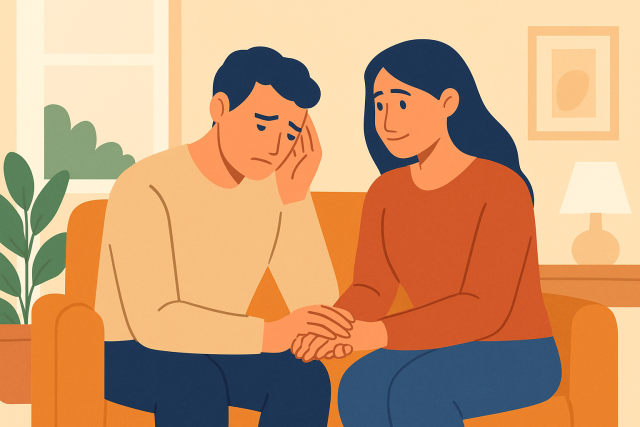
Are Relationships Built on Sharing Memories or Something More?
Are relationships truly built on shared memories, or is there a deeper foundation that sustains last...
Overthinking in relationships usually means getting stuck in your head and endlessly replaying your partner’s actions or motives. It is often fueled by insecurity or old wounds.
Overthinking often sneaks in as these pesky repetitive mental loops like second-guessing your partner’s feelings or replaying past conversations on a relentless loop hunting for some hidden meaning. These patterns tend to stir up a lot of negativity and pile on extra stress.
When overthinking crashes the party it often brings up insecurities that plant seeds of doubt about your partner and the relationship. This can lead to communication hiccups because you might pull back to avoid conflict or confront your partner based on assumptions instead of facts. Over time this emotional distance widens making intimacy feel fragile and gradually chipping away at the trust relationships rely on.
"Overthinking in relationships often puts up walls that stop partners from really getting each other and building trust. Figuring out how to tame those racing thoughts usually turns out to be the secret sauce for nurturing growth and a deeper, more meaningful connection." — Dr. Anne L. Peters, Relationship Therapist
Cutting down on overthinking definitely takes some deliberate effort and a good dose of patience. Once you start to notice what triggers those runaway thoughts—and trust me, everyone has their own sneaky triggers—you can use practical strategies to keep them in check and gradually build more confidence in your relationship.
Each step takes deliberate effort no doubt about it. Keeping an eye on your triggers can give you a heads-up when overthinking creeps in. Mindfulness acts like an anchor keeping you grounded in the moment and easing anxiety. Being open in communication builds trust—it’s like laying down the welcome mat for honest connections. Setting boundaries protects your mental health like a good fence keeps the garden safe. Looking at your thoughts through the lens of facts helps clear up pesky distortions. Showing yourself a bit of self-compassion can soften the blow of harsh self-judgment.

Open and honest communication with your partner is absolutely important when it comes to taming that pesky overthinking. It not only reassures both of you but also sidesteps the usual misunderstandings and puts the brakes on the endless loop of assumptions that tend to fuel anxiety.
Tackling relationships head-on, building habits that support your mental health can seriously help cut down on overthinking. Taking care of stress and your emotional wellbeing through everyday choices usually keeps your mind a bit clearer and more balanced
If overthinking begins to spiral out of control or causes heavy anxiety, depression or attachment fears, it could be a sign of deeper psychological struggles—especially when trying to figure out how to stop overthinking in a relationship. Therapy or counseling often helps by providing practical tools to explore root causes, cultivate healthier thinking patterns and build emotional resilience.
There’s no one-size-fits-all timeline since it depends on the individual and what’s fueling the overthinking. People who regularly practice mindfulness and keep communication open often start noticing a difference within a few weeks or months. It’s more about slowly rewiring your mental habits than hoping for a magic overnight fix.
A legitimate concern usually stems from clear evidence or specific events while overthinking bubbles up from anxiety, assumptions and reading too much into unclear actions negatively. If you can’t point to solid facts and find yourself tangled in ‘what if’ scenarios or worries from your imagination, chances are you’re slipping into overthinking territory.
Absolutely it can. Even when you keep it bottled up, overthinking sneaks into how you act. It can make you seem distant, withdrawn or overly sensitive—flags your partner will pick up on sooner or later. Over time this quietly chips away at trust and closeness creating a weird kind of strain that feels confusing to them since the real culprit—the swirling thoughts in your head—isn’t out in the open.
Not strictly necessary but opening up usually does wonders. Using ‘I’ statements like ‘I sometimes struggle with anxiety and tend to overanalyze things’ can paint a clearer picture for your partner without making it feel like blame is flying around. This honest sharing paves the way for asking for reassurance in a way that’s healthy and supportive rather than awkward or tense.
It’s a smart move to look into therapy if overthinking brings you significant daily stress, sparks frequent arguments or ties back to past trauma. Also consider therapy if trying to tough it out on your own hasn’t eased the burden. A good therapist can help you untangle underlying anxieties and attachment issues with practical strategies.

Are relationships truly built on shared memories, or is there a deeper foundation that sustains last...

Broken trust can fracture any relationship, but healing is possible. Discover practical, step-by-ste...

Discover practical strategies for supporting a loved one with schizophrenia while safeguarding your...

Slow burn relationships build love gradually, creating strong, lasting bonds. Discover the signs tha...